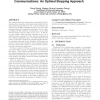163 search results - page 29 / 33 » Solving Simple Stochastic Games |
JAIR
2000
13 years 7 months ago
2000
Partially observable Markov decision processes (POMDPs) provide an elegant mathematical framework for modeling complex decision and planning problems in stochastic domains in whic...
INFOCOM
2010
IEEE
13 years 6 months ago
2010
IEEE
—We consider a widely applicable model of resource allocation where two sequences of events are coupled: on a continuous time axis (t), network dynamics evolve over time. On a di...
MOBIHOC
2007
ACM
14 years 7 months ago
2007
ACM
We consider distributed opportunistic scheduling (DOS) in wireless ad-hoc networks, where many links contend for the same channel using random access. In such networks, distribute...
ATAL
2008
Springer
13 years 9 months ago
2008
Springer
The application of reinforcement learning algorithms to Partially Observable Stochastic Games (POSG) is challenging since each agent does not have access to the whole state inform...
SIGMETRICS
2008
ACM
13 years 7 months ago
2008
ACM
We consider a wireless collision channel, shared by a finite number of mobile users who transmit to a common base station using a random access protocol. Mobiles are selfoptimizin...

